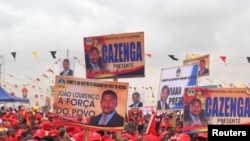The poll on Wednesday will put young and mostly-poor voters in competition with veteran politicians.
The youthful electorate will decide whether to continue with the People’s Movement for the Liberation of Angola (MPLA) that has ruled since independence or choose to embrace change with the opposition.
Observers say discontent with the rule of the MPLA has reached a point where the party will only now secure another five years in power through rigging and repression.
Paula Cristina Roque, an independent analyst and author, says that “It is an existential election, and it is going to be very tight race. If there were free and fair elections, there is no doubt the opposition would win but the government is not going to allow that.”
Although there are eight political parties in Angola, the real contest is between the ruling MPLA of Angola and its long-standing rival and former rebel movement the National Union for the Total Independence of Angola (UNITA).
Many Angolans are weary of the party that has held power since the country won independence from colonial power Portugal in 1975, according to media reports.
Despite the oil wealth that benefited the former president Jose Eduardo dos Santos and his family, many of Angola’s 33 million people live in poverty and seek change.
Political Commentator in the Capital Luanda Claudio Silva says that “There is a lot of expectation within society and People are very excited because there is a prospect for actual change.”
For many Angolans, the most effective change is UNITA leader Adalberto Costa Junior who has reinvigorated the opposition since taking the helm in 2019.
A key factor in Angola is the youth of the population. Accordign to the UN data. more than 60% of Angola’s population are under 24.
Augusto Santana, an electoral observation specialist, says that young people’s concerns differ from older voters.
“Youth are looking for better education, jobs and living conditions and want to experience something different.”





![2022 Elections Most Historic Angola Polls Since 92 [02:48]](https://gdb.voanews.com/5a306208-96cb-4159-9f72-8d4f781d4ff6_w33_r1.jpg)




